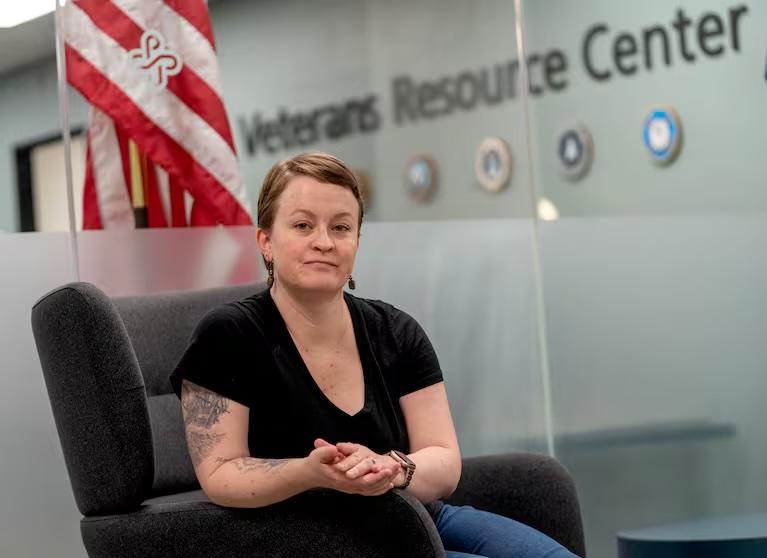
Megan Sholin is preparing for the worst.
Soft-spoken, with a compass and a ship tattooed on her right arm, Sholin served six years as a U.S. Navy linguist, deploying twice to the Middle East before her service ended in 2014. Now she relies on government benefits to help pay for an apartment and her mechanical engineering program at Portland State University.
But President Donald Trump and his allies are shrinking the government, threatening to cut federal benefits and jobs. Sholin fears what might come next: Will she wait longer for appointments with the Department of Veterans Affairs? Without benefits, how would she pay off student loans, debt and the rising cost of rent?
“We’re pretty much putting everything extra we have in savings in case it does happen,” said Sholin, 35. “But that could only get us by a couple months.”
The questions facing Sholin are looming over veterans, their families and the people who support them. Under Trump, the Department of Veterans Affairs is primed to cut more than 80,000 jobs, a move that could spark turmoil amid the mass firings that have swept the nation since the president’s term began. Few groups face uncertainty quite like Oregon’s veterans.
More than 266,000 veterans live in Oregon, just over 6% of the state’s population, according to a 2024 report from the Oregon Department of Veterans’ Affairs. A disproportionate number of them — 23% — work for the federal government, according to the Oregon Employment Department.
Veterans and their advocates are concerned that the cuts proposed by Trump could hinder veteran services in Oregon, increasing wait times for benefits claims and slashing programs that many depend on, like Social Security and Medicaid.
Four VA employees in Oregon spoke with OPB on the condition of anonymity because they said they feared losing their jobs. They say the VA is full of dedicated employees and the cuts could place the quality and consistency of veterans’ health care at risk, potentially deepening distrust with the VA.
“I think it could be catastrophic,” an employee said.
The VA operates 28 facilities across Oregon. That includes the medical center on Marquam Hill in Southwest Portland, which partners in education, research and patient care with Oregon Health & Science University and is physically connected via a skybridge. Another medical center sits in nearby Vancouver, Washington.

In a statement to OPB, Shaneka Barefield, a public affairs specialist with the VA, said “a small number of probationary staff” were dismissed from Oregon VA facilities as part of the 1,400 cuts nationwide in February. “This decision had no negative effect on Veteran health care, benefits or other services and will allow VA to focus more effectively on its core mission of serving Veterans, families, caregivers and survivors,” Barefield said.
Over the years, the VA has struggled to manage long wait times, denied disability claims, suicides among veterans, turmoil among top leadership and allegations of misused funds. The agency has long faced “system-wide challenges in overseeing patient safety and access to care, hiring critical staff, and meeting future infrastructure needs,” the Government Accountability Office said.
“Unfortunately, many in the media, government union bosses and some in Congress are fighting to keep in place the broken status quo,” said Barefield. “Our message to Veterans is simple: Despite major opposition from those who don’t want to change a thing at VA, we will reform the department to make it work better for Veterans, families, caregivers and survivors.”
Trump’s orders rock VA
Already, some VA employees say, the department has been roiled by the actions of Trump and his billionaire ally, Elon Musk, who leads the administration’s cost-cutting effort called the Department of Government Efficiency. In recent months, some VA research positions have been cut as federal contracts have ended, and other employees have been fired and rehired, they say.
Employees described being ordered via email to report their coworkers engaging in work related to diversity, equity and inclusion. An employee called it “a witch hunt,” adding, “if you are aware of it and don’t report it, you can also be held liable.”
Collectively, the federal government’s actions have soured morale among VA employees. At VA facilities, staff treat and conduct research on veterans who suffer from PTSD, traumatic brain injuries and epilepsy. Many are specially trained to support veterans who have amputated limbs or struggle with alcoholism, homelessness or mental health problems, including thoughts of suicide.
Employees say the firings have increased stress not only among staff, but also among their patients. One described their conversations with eight patients over two days: “They were crying. They were mad. They were scared. They were asking me, the provider, if I’m OK.”

And now, as the VA rolls back gender-affirming hormonal treatment, two employees said some transgender veterans are considering ending their care at the VA entirely.
“It feels offensive,” U.S. Sen. Jeff Merkley, a Democrat, said of the cuts in an interview. “It feels offensive to folks (who) serve our country often in extraordinarily dangerous situations overseas. They didn’t have a choice on whether or not they went to fight in Afghanistan or in Iraq, or in the past, in Vietnam or other locations. And now they have a government that seems to be really uninterested in their welfare.”
VA defends actions
Veterans Affairs Secretary Doug Collins has insisted that veterans’ health care and benefits are not on the chopping block. U.S. Rep. Mike Bost, a Republican who chairs the House Veterans Affairs Committee, said in March that essential VA jobs are not being cut.
During President Joe Biden’s administration, a backlog of disability benefits claims increased, a VA spokesperson noted, while the VA’s staff increased by more than 52,000 positions and its budget increased by $89 billion.
“But those increases haven’t resulted in better performance,” Barefield, the agency spokesperson, said in an email. “Instead, average VA wait times for primary, mental health and specialty care increased under Biden.”
Those who say the VA is cutting benefits and health care are “not only being dishonest, they are ignoring our actions,” Barefield said. The VA has opened six new clinics in the country since January 20 and plans to open more, Barefield said.
“Fearmongering from the media and lawmakers opposed to much-needed reforms will do more to drive away staff and patients than VA’s commonsense reforms ever will,” Barefield said.
VA staffing woes
VA facilities serve as critical health care research hubs, as well as training grounds for prospective health care workers. But employees fear the cuts could deepen the VA’s ongoing struggles to recruit and retain staff in the future.
Nationwide, the health care system reported more than 40,000 vacancies at the end of 2024. Weeks ago, in the rural town of Enterprise in eastern Oregon, a VA clinic closed. Concerned that veterans would be forced to drive further for support, Merkley and U.S. Sen. Ron Wyden wrote a letter to Collins, the VA secretary.
“Taken together, these actions have jeopardized the quality and timeliness of care for veterans nationwide,” the letter said. “The closure of the Wallowa County VA Clinic in the context of all of these actions leaves us with deep concerns about how the VA will meet our veterans’ needs.”
Barefield explained that the VA made a request on Jan. 8 — 12 days before Trump’s inauguration — to close the clinic after “reviewing access and operational costs.” The VA shut the clinic down on March 31. Barefield said staff at a VA medical center, in Walla Walla, Washington, informed community members of the closures at town halls over four months and informed congressional representatives.
“Staff contacted each of the roughly 100 veterans who received care at this clinic and helped Veterans either change to another VA clinic or find care in the community, ensuring continuity of care for all affected patients,” said Barefield.
Some fear increased wait times
VA employees and veteran service officers caution that the cuts are not yet affecting the quality of service. Jason Davis, a spokesperson for Lane County Health and Human Services, which includes veteran services, said in an email: “(A)t this point we haven’t seen any identifiable impacts to veterans.”
Sean Files, a veteran service officer in Washington County, says benefits claims already take between four and five months, and cuts to the VA could make things even longer. He said veterans often file such claims — for disability compensation or their military pension — “when they’re disabled, when they’re struggling to work, when they’re kind of socially isolated or not able to live their life as they want.”
“If you’re hearing about cuts, a lot of veterans, I think, are valid to be concerned that it may be six months or a year until that happens, or things could be on hold for the foreseeable future,” said Files. “And that may turn them away. It may cause additional anxiety. And I think we’re really concerned as their advocates about that.”
Christopher Holt knows what the wait is like. A Columbia County resident who works as a manufacturing technician for Intel, Holt served for five years in the U.S. Navy while based on the East Coast, operating radars and radios on service combat vessels. He has spent almost the same amount of time trying to get his disability claim approved by the VA, he said.
“Now, because of Trump, that’s going to be made longer now,” said Holt. “There’s not going to be as many people. Well, at this point I’ve resigned myself to probably never seeing the end of this case. But I’m not going to quit.”
PSU student worries for future
For Sholin, service was a means to build a career and escape from the high-desert community of Hesperia, Southern California, where she’s from. A pivotal moment came in 2008, when Ann DeBaets Gilbride, a then high-ranking Naval officer, visited Sholin’s high school and gave her a Navy challenge coin, which she still keeps tucked away in a box.

After leaving the Navy, Sholin saw that returning to civilian life could be “jarring and really tricky.” At PSU, Sholin joined on-campus groups to help veterans with the transition.
Sholin struggled, too. Tinnitus from working on a loud aircraft. Service-related post-traumatic stress disorder. She switched primary care doctors when her VA physician needed to reduce her caseload, she said. Recently, she started therapy at the VA medical center, adding: “That took a couple months just to have our first appointment.”
“Being able to go up to the VA here has been really helpful,” she said. “The idea of them limiting staff or getting rid of staff just blows my mind.”
